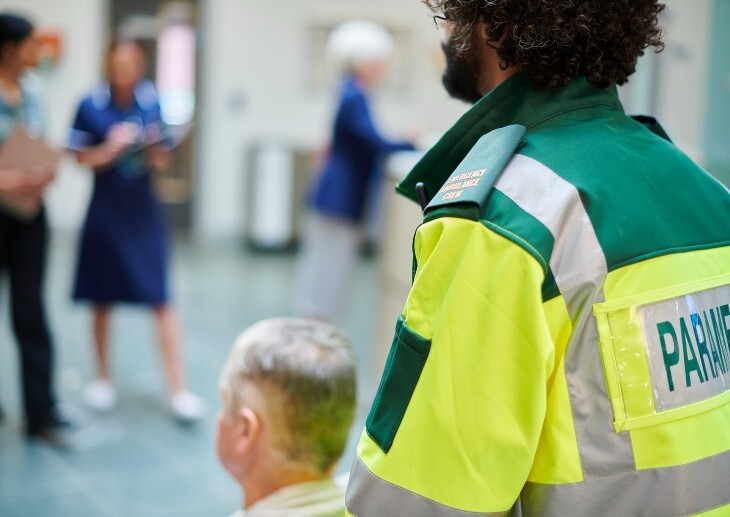Multi disciplinary working in Nottingham and Nottinghamshire ICB to support people with moderate to severe frailty is improving outcomes for patients. Kathy Oxtoby reports
A scheme to create a more integrated approach to supporting people with moderate to severe frailty to enable them to access the right care at the right time, is bringing care closer to home in Nottingham and Nottinghamshire.
Launched last December, the Bassetlaw Frailty Hub was established in recognition of the increasing ageing population – highlighted by population health data – which is growing faster in Bassetlaw than in other areas within Nottingham and Nottinghamshire ICS.
With people living with moderate and severe frailty, ‘it was important to test out, what makes an impact and how can we support them better’, says Victoria McGregor-Riley, director of strategy and system development at Nottingham and Nottinghamshire ICB.
The scheme involves Retford & Villages PCN working with partners in the Bassetlaw placed based partnership. ‘They came together to think about what they could do as a partnership to improve the health of the local people and improve outcomes, by working differently together,’ says Ms McGregor-Riley.
The partnership came up with the idea of creating a multidisciplinary team, linking the expertise of senior GPs and the local PCN workforce, with the community healthcare trust and the acute trust.
The acute trust has now recruited a frailty nurse who is aligned to the medical consultant with a special interest in frailty at Doncaster and Bassetlaw Teaching Hospitals NHS Foundation Trust. They work across acute, primary and community services, and engage directly with the PCNs in Bassetlaw.
While the process of recruiting the frailty nurse was underway, in the meantime GPs in Retford & Villages PCN have been developing a proactive approach to the identification of patients with severe and moderate frailty, and having multidisciplinary team conversations with the broader community services and also local voluntary sector representatives.
GPs are linking in with social prescribing link workers, community therapy services, the district council housing adaptation scheme, and other voluntary, community and social enterprise (VCSE) partners, supporting the mental and physical health of people living with frailty.
This includes, for example, VCSE providing cancer support, access to falls prevention and rehabilitation services, Citizens Advice information about warming homes, and financial management.
‘It’s not just a clinical response, it’s about a whole person response to meeting people’s needs,’ says Ms McGregor-Riley. ‘We know those other non-medical things make such a big difference to people’s overall health and wellbeing.’
Early indications of this approach is that it ‘seems to be reaping dividends’, she says. For example, Retford & Villages PCN, where the scheme is being rolled out most, has increased its recording of clinical frailty scores for people living in care homes by 22.5% compared to other PCNs that have not been taking part in the project in Bassetlaw.
Retford & Villages PCN has also increased its falls assessment for people with severe and moderate frailty by nearly 11%.
Structured medication reviews – which are significant in supporting the reduction in emergency admissions – have increased by 12% per cent, whereas other local peers have reduced the number of these reviews in the last 12 months.
‘There’s some very early signs that the scheme is going to have a positive impact on improving patient outcomes and supporting people to live well and independently at home for longer,’ says Ms McGregor-Riley.
GPs and the practice staff at Retford & Villages PCN are reporting how positive they feel about the initiative. ‘They are feeling that they are making a difference. And the PCN clinical team feels the initiative is having a positive impact on patient care, making them a lot more energised about the work they are doing,’ she says.
With the scheme, ‘the data and the local intelligence have come together via the place-based partnership to identify where the best opportunity is to not only improve outcomes but also make better use of our resources’, she says.
The approach is also more cost effective, allowing people to be looked after in their own homes where possible, rather than in hospital, she says.
People with frailty admitted to hospital care are also likely to become even more frail and lose the ability to maintain their independence, she says.
In terms of funding for the initiative, the ICB contributes the transformational and clinical leadership into the place-based partnership.
Doncaster and Bassetlaw Teaching Hospitals NHS Foundation Trust is a member of the Bassetlaw placed based partnership. ‘The ICB has consistently supported these partnerships across Nottingham and Nottinghamshire and invested in providing dedicated transformational resource into each of these partnerships,’ says Ms McGregor-Riley.
The project has ‘’taken off because of the absolute commitment of local GPs and local GP leaders at Retford & Villages PCN’, she says. ‘They have been a real driving force for this.’
With the project ‘we’re keeping an eye on the data, to understand what the impact is and how people are feeling about the approach, both from a patient and also a partnership point of view’, she says.
‘We’ll take the learning from that and see where the opportunities are for a broader scale spread.’
She says the ‘early signs are that the multidisciplinary approach, active engagement from GPs, in combination with a partnership approach, and making sure that we are holistic in our support for patients, are making a difference’.
‘Most people are aware of the value of multidisciplinary working and of offering prevention as a key component of how they support people,’ she says. ‘But it needs to be prevention at all levels – it’s secondary and tertiary prevention from a clinical point of view. But it’s also primary prevention and thinking about the building blocks of health – those are as important in supporting people to stay well and independent in a community setting.’




